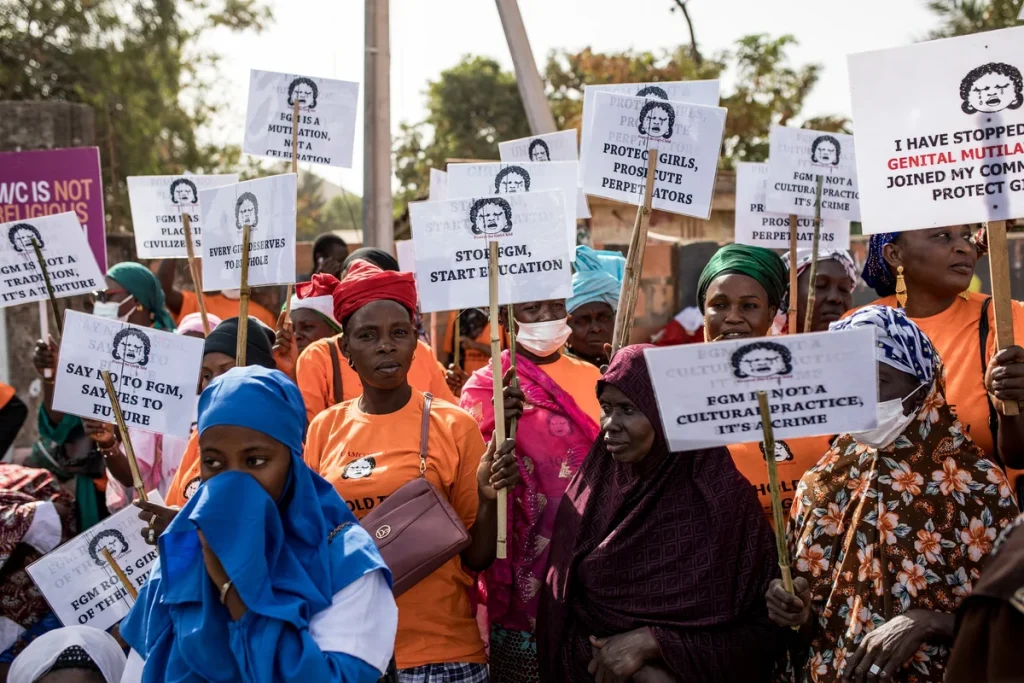A bill seeking to repeal the ban on female genital mutilation (FGM) in Gambia has been sent to a parliamentary committee for further scrutiny before it returns to the legislative floor for a third reading. Members of the West African country’s parliament voted 42 to 4 in favor of the consideration.
Introduced earlier this month by lawmaker Almammeh Gibba, the bill proposes an outright reversal of the ban on FGM, put in place by former autocratic ruler Yahya Jammeh, back in 2015. While the ban reportedly reduced the number of young girls and women that FGM is practiced on in Gambia, it wasn’t tightly prosecuted until last year when three women were convicted and fined huge sums for practicing FGM. This bill being considered goes against that landmark court ruling.
FGM is the cutting or removal of external female genitalia, including the labia and clitoris. The basis of the act is rooted in religion, as an allegedly proactive measure to tame sexual desire and promiscuity. However, many FGM survivors and activists have stated that genital cutting causes a myriad of mental and physical health issues, including the possibility of bleeding to death and the ever-present fear of deadly infections because the procedure is often carried out informally, and in some cases with unsanitary tools.
In Gambia, a majority Muslim country, the pro-FGM bill is being supported by influential Islamic clerics and their followers. “This bill is for us to maintain peace, law and order because we believe that the law is discriminatory; it’s a law that protects one side and deter others,” Gibba said, shortly after presenting the bill to parliament. He added that female circumcision is “a practice deeply rooted in the ethnic, traditional, cultural and religious beliefs of the majority of the Gambian people. [The bill] seeks to uphold religious purity and safeguard cultural norms and values.”
However, activists warn that the bill passing will put girls as young as 5 at risk from a harmful procedure, adding that it’s a form of controlling women’s bodies and their sexuality. Jaha Dukureh, who operates an NGO dedicated to ending FGM practice, told AP News that the potential repeal of the ban could open the door for other women’s rights laws to be revised negatively.
“If they succeed with this repeal, we know that they might come after the child marriage law and even the domestic violence law. This is not about religion but the cycle of controlling women and their bodies,” Dukureh said.
Public opinion is split on the bill, with both pro and anti-FGM protests happening in front of the country’s parliament during Monday’s debate in Banjul. “The circumcision is a religious right, there is no FGM in Gambia at all,” a banner read. In an opposite stance, two smaller banners conjoined read: “FGM/C is not a religious obligation. Hear the voices of FGM/C survivors.”
While the basis of the pro-FGM bill in Gambia is rooted in religion, there’s no definitive consensus in Islam about the virtues of genital cutting. Back in 2007, Egyptian Grand Mufti Ali Gomaa called female circumcision a “harmful tradition.” In many societies across Africa and the Middle East, genital cutting is seen as a rite of passage. In Uganda, 26-year-old Sylvia Yeko broke the law against FGM in 2019 to be circumcised, stating her pride because she had become “someone respected.”
Th UN estimates that over 230 million women have been subjected to genital cutting, a 15 percent increase in the numbers from eight years ago. If Gambia repeals the ban on FGM, it will be the first country to roll back measures against genital cutting. The bill will undergo a third reading and another round of voting, before landing on the desk of President Adama Barrow, who hasn’t indicated support for or against the bill.
